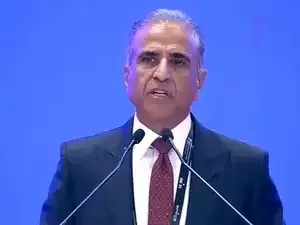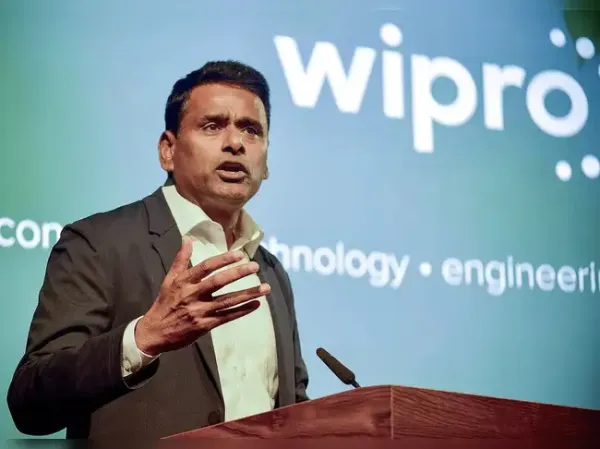Chairman Sunil Mittal said Airtel's coverage across the country further expanded in FY25 with the deployment of over 20,000 network sites and over 44,000 kilometers of fiber.
Bharti Airtel's revenue market share (RMS) touched a record around 40% in FY25, growing 178 basis points on-year, for its mobile services business even as its vice chairman Gopal Vittal called for further "tariff repair" for a sustainable return on capital employed.
Airtel's strong revenue growth was supported by an improved portfolio mix, continued premiumisation and tariff repair across our mobile pricing plans, the company said in its annual report released Thursday.
During FY25, Bharti Airtel chairman Sunil Mittal drew an annual remuneration of Rs 32.55 crore, an increase of 0.89% over the previous fiscal. Vice Chairman and Vittal, also the managing director, drew an annual salary of Rs 20.2 crore, a 9.14% increase over last year.
The company paid Rs 37,300 crores in license fee and spectrum usage charges to the state exchequer. It additionally paid Rs 28,900 towards spectrum obligations, including annual and prepayment of past spectrum dues in FY2025.
"Over the past five years, Airtel's contribution to the Exchequer is nearly Rs 2.5 trillion, reflecting our commitment to national development," chairman Sunil Bharti Mittal said in the annual report.
Airtel's revenue grew 17.9% on-year in FY25 to Rs 1.25 lakh crore with an EBITDA of Rs 57,909 crore, resulting in a lifetime-high revenue market share.
"In mobility, we delivered a record-high revenue market share of ~40 percent and added over 9.3 million new
customers in FY 2024-25," vice chairman and managing director Gopal Vittal said in the report.
The second-largest telecom operator had added 24 million net 4G/5G customers in FY25 even as its ARPU (average revenue per user), a key performance metric, increased by Rs 36 to Rs 245 during the period.
"Our focus remains on growing our postpaid base, driving smartphone upgrades and expanding international roaming penetration," Vittal said.
He added that while the much-awaited tariff repair took place in July 2024, there is need for further repair to ensure sustainable improvement in return on capital employed.
Chairman Sunil Mittal said Airtel's coverage across the country further expanded in FY25 with the deployment of over 20,000 network sites and over 44,000 kilometers of fiber.
"I am also pleased to share that your Company is fully ready to transition to a standalone 5G network. This will happen when 5G becomes the mainstay wireless technology, while we continue to conduct pilot testing," Mittal said.
Airtel closed the previous fiscal with over 135 million 5G users, compared to 72 million last year, reflecting rapid adoption and network expansion, the company said.
The telco offers 5G services through a non-standalone architecture, which it said was a calculated decision resulting in significant savings in capex and network operating expenses. "This has enabled Airtel to deliver 5G services at the lowest TCO (Total cost of ownership)," Mittal said.
Airtel's Africa business faced macroeconomic headwinds but delivered a resilient performance in FY25. "The business continued its steady growth momentum , recording underlying constant currency revenue growth of 21% and EBITDA growth of 18%," Mittal said.
"Airtel Africa’s balance sheet remains healthy, with comfortable leverage. The majority of debt is now denominated in local currencies, effectively mitigating exposure to forex volatility," he added.
The company's broadband business also gained momentum in India, adding 2.4 million new broadband customers, driven by its launch of fixed wireless services (FWA) in more than 2,500 cities.
Airtel also achieved record high market share in the DTH (Direct to Home) industry, despite industry headwinds.
"We are making structural changes to our DTH business by eliminating subsidies, which will benefit cash flow," Vittal said.
Airtel's B2B segment, however, saw slow overall growth, Vittal said, due to the company's deliberate shift away from low-margin, commodity business.
Airtel had 13,593 permanent employees and 71,861 non-permanent workers as of March 31, 2025.
Airtel's strong revenue growth was supported by an improved portfolio mix, continued premiumisation and tariff repair across our mobile pricing plans, the company said in its annual report released Thursday.
During FY25, Bharti Airtel chairman Sunil Mittal drew an annual remuneration of Rs 32.55 crore, an increase of 0.89% over the previous fiscal. Vice Chairman and Vittal, also the managing director, drew an annual salary of Rs 20.2 crore, a 9.14% increase over last year.
The company paid Rs 37,300 crores in license fee and spectrum usage charges to the state exchequer. It additionally paid Rs 28,900 towards spectrum obligations, including annual and prepayment of past spectrum dues in FY2025.
"Over the past five years, Airtel's contribution to the Exchequer is nearly Rs 2.5 trillion, reflecting our commitment to national development," chairman Sunil Bharti Mittal said in the annual report.
Airtel's revenue grew 17.9% on-year in FY25 to Rs 1.25 lakh crore with an EBITDA of Rs 57,909 crore, resulting in a lifetime-high revenue market share.
"In mobility, we delivered a record-high revenue market share of ~40 percent and added over 9.3 million new
customers in FY 2024-25," vice chairman and managing director Gopal Vittal said in the report.
The second-largest telecom operator had added 24 million net 4G/5G customers in FY25 even as its ARPU (average revenue per user), a key performance metric, increased by Rs 36 to Rs 245 during the period.
"Our focus remains on growing our postpaid base, driving smartphone upgrades and expanding international roaming penetration," Vittal said.
He added that while the much-awaited tariff repair took place in July 2024, there is need for further repair to ensure sustainable improvement in return on capital employed.
Chairman Sunil Mittal said Airtel's coverage across the country further expanded in FY25 with the deployment of over 20,000 network sites and over 44,000 kilometers of fiber.
"I am also pleased to share that your Company is fully ready to transition to a standalone 5G network. This will happen when 5G becomes the mainstay wireless technology, while we continue to conduct pilot testing," Mittal said.
Airtel closed the previous fiscal with over 135 million 5G users, compared to 72 million last year, reflecting rapid adoption and network expansion, the company said.
The telco offers 5G services through a non-standalone architecture, which it said was a calculated decision resulting in significant savings in capex and network operating expenses. "This has enabled Airtel to deliver 5G services at the lowest TCO (Total cost of ownership)," Mittal said.
Airtel's Africa business faced macroeconomic headwinds but delivered a resilient performance in FY25. "The business continued its steady growth momentum , recording underlying constant currency revenue growth of 21% and EBITDA growth of 18%," Mittal said.
"Airtel Africa’s balance sheet remains healthy, with comfortable leverage. The majority of debt is now denominated in local currencies, effectively mitigating exposure to forex volatility," he added.
The company's broadband business also gained momentum in India, adding 2.4 million new broadband customers, driven by its launch of fixed wireless services (FWA) in more than 2,500 cities.
Airtel also achieved record high market share in the DTH (Direct to Home) industry, despite industry headwinds.
"We are making structural changes to our DTH business by eliminating subsidies, which will benefit cash flow," Vittal said.
Airtel's B2B segment, however, saw slow overall growth, Vittal said, due to the company's deliberate shift away from low-margin, commodity business.
Airtel had 13,593 permanent employees and 71,861 non-permanent workers as of March 31, 2025.





